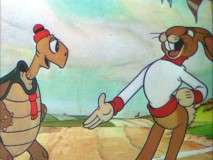The Tortoise and the Hare (film)
| The Tortoise and the Hare | |
|---|---|
| Silly Symphonies series | |
 Toby Tortoise and Max Hare | |
| Directed by | Wilfred Jackson |
| Produced by | Walt Disney |
| Story by | Larry Clemmons |
| Voices by |
Eddie Holden Ned Norton Pinto Colvig |
| Music by | Frank Churchill |
| Animation by |
Hamilton Luske Larry Clemmons Dick Lundy Les Clark Louie Schmitt Dick Huemer Eric Larson Frenchy de Tremaudan Milt Schaffer |
| Studio | Walt Disney Productions |
| Distributed by | United Artists |
| Release date(s) |
|
| Color process | Technicolor |
| Running time | 8 minutes 17 seconds |
| Language | English |
The Tortoise and the Hare is an animated short film released on January 5, 1935 by United Artists, produced by Walt Disney and directed by Wilfred Jackson. Based on an Aesop's fable of the same name, The Tortoise and the Hare won the 1934 Academy Award for Best Short Subject: Cartoons. This cartoon is also believed to be one of the inspirations for Bugs Bunny, who first appeared in 1940.[1]
Summary
Unlike the original fable, the race is a major sporting event, as opposed to a challenge between the hare and the tortoise. Max Hare is the heavy favorite to win---he's cocky, athletic and incredibly fast. His challenger, Toby Tortoise, is teased and jeered for being sluggish and clumsy. He does seem to have the ability to stretch, which comes in handy in certain situations. Max tells Toby that he intends to play fair, but it seems obvious that Max is just out to humiliate his competition. The race begins and Max zooms off. It takes an extra nudge from the starter to get Toby going.
Max seems to dominate the race, zooming past everything on the road. At one point, possibly as a homage to the fable, Max pretends to nap under a tree, just to watch Toby's progress. Thinking that Max really is asleep, Toby quietly creeps past him. Not long after, Max gets up and bolts past him again. A little further down the road, Max passes a girls' school, and stops to talk to the female bunnies. As Toby lumbers past, the girls invite him to stop as well, but Toby politely turns down their offer, as he's committed to finishing the race. Even though Toby's now in the lead, Max opts to stay for a while, as he's confident that he'll have no trouble catching up with Toby, because of how slow he is. Max uses the girls' sports field to show off his amazing athletic skills in archery, baseball and tennis (even knocking a tennis ball into the camera in the process!).
Just then, Max hears the crowd cheering and sees that Toby's not far from the finish line. He bids the girls farewell and charges off, still confident that he will win easily. Toby sees Max catching up and picks up his pace by stretching his legs. In the end, the race is close. Max crosses the finish line and skids to a rough halt. Once he gets up and dusts himself off, he realizes that he lost by a "neck's length." The crowd rushes to congratulate the winner: Toby Tortoise.
Other appearances
Toby Tortoise and Max Hare reappear in the cartoon short Toby Tortoise Returns.
The girl bunnies and the animal pedestrians make cameos in Toontown, while Toby Tortoise is on a poster in the toontown alleyway and appears during the final scene of Who Framed Roger Rabbit. Toby and Max also appear as guests in Disney's House of Mouse.
Sources
- Barrier, Michael (2003). "Warner Bros., 1933-1940". Hollywood Cartoons : American Animation in Its Golden Age: American Animation in Its Golden Age. Oxford University Press. ISBN 9780198020790.
Home Video
Disney's The Tortoise and the Hare was released on the Disney Treasures Collection of Silly Symphonies Vol. 1.
External links
- Official website
- The Tortoise and the Hare at the Internet Movie Database
- The Tortoise and the Hare at The Big Cartoon DataBase
References
- ↑ Barrier (2003), p. 359-362